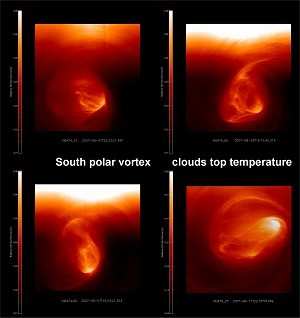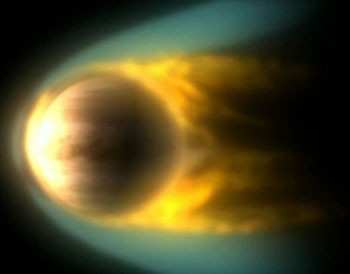Cites Similarities In Atmosphere, Mass
 The European Space
Agency's Venus Express probe has revealed Venus as never before.
For the first time, scientists are able to investigate from the top
of its atmosphere, down nearly to the surface. They have shown it
to be a planet of surprises that may once have been more
Earth-like... and still is, to a certain extent.
The European Space
Agency's Venus Express probe has revealed Venus as never before.
For the first time, scientists are able to investigate from the top
of its atmosphere, down nearly to the surface. They have shown it
to be a planet of surprises that may once have been more
Earth-like... and still is, to a certain extent.
The latest results from the mission were presented this week at
conference held at ESA headquarters in Paris, and appear in the
November 29 issue of the scientific journal Nature.
Permanently covered in clouds, Venus has been a mystery for
centuries. Although it is the planet nearest to Earth, it has
proved extraordinarily difficult to study because of its curtain of
clouds that obscures our view of its surface.
"It is really surprising how un-Earth-like Venus is now," says
Fred Taylor, a Venus Express interdisciplinary scientist,
University of Oxford, UK. Venus has approximately the same mass as
the Earth yet it is a hellish place where surface temperatures are
over 400 degrees Celsius and the surface pressure is a hundred
times that on Earth.
The key to understanding Venus lies in its atmosphere. It is
much thicker than Earth's and intercepts most of the Sun's energy
before it can reach the surface. That's where Venus Express comes
in.
"Today's results focus on the different science themes Venus
Express is covering," says Dmitri Titov, Venus Express science
coordinator from the Max-Planck-Institute for Solar System
Research, Germany. "An important first set of results concerns the
complex dynamics and structure of Venus's atmosphere, studied with
a whole suite of instruments."
Titov added, "The spacecraft has revealed the structure and
movements of the atmosphere, from its upper reaches to just above
the surface, and has obtained the best global map of atmospheric
temperatures to date. This is already improving our understanding
of the global dynamics and the meteorology of Venus."
"It is worthwhile mentioning the amazing 3D images of the south
polar vortex, the fine details of clouds some very Earth-like and
hazes, precise wind measurements, and the nicest views ever of the
phenomena that make Venus glow in space at infrared wavelengths,"
added Hakan Svedhem, ESA's project scientist for Venus Express.
A second set of results concerns both the atmosphere's
composition and its chemistry. Venus Express has taken
compositional profiles of the atmosphere around the planet, and
unambiguously confirmed the presence of lightning which can have a
strong effect on the composition of the atmosphere itself.
The challenge for scientists now is to match those readings of
the atmosphere's composition with known gases, because they behave
differently in the extraordinarily high-pressure environment on
Venus than they do on Earth or Mars. "We are only at the beginning
of this work," says Titov, "but we know new surprises are waiting
for us."
A third set of results is about the processes by which the
atmosphere of Venus is escaping into space. This is driven by the
solar wind - a stream of electrically charged particles given out
by the Sun. As the solar particles collide with electrically
charged particles near Venus, they energize the gases, stripping
them forever from the planet.
Venus Express has provided giant leaps in the understanding of
all these phenomena, and found how Venus loses water due its
interaction with the solar wind. New measurements of heavy water in
the atmosphere are also providing new clues on the history of water
on the planet and its overall climate evolution.
However, not all mysteries are solved yet. One key answer that
scientists would still like to know is just how active the
volcanoes of Venus are. "The contribution of volcanoes to the
atmosphere could be enormous. Not knowing leaves a huge hole in our
understanding of the climate," says Taylor.

For a planet that was once thought to resemble Earth, to one
that was thought to be completely dissimilar, the tables have
turned again. Thanks to Venus Express, Taylor now describes Venus
as "Earth's twin, but separated at birth."
 ANN's Daily Aero-Linx (04.16.24)
ANN's Daily Aero-Linx (04.16.24) Aero-News: Quote of the Day (04.16.24)
Aero-News: Quote of the Day (04.16.24) Airborne 04.10.24: SnF24!, A50 Heritage Reveal, HeliCycle!, Montaer MC-01
Airborne 04.10.24: SnF24!, A50 Heritage Reveal, HeliCycle!, Montaer MC-01 Airborne 04.12.24: SnF24!, G100UL Is Here, Holy Micro, Plane Tags
Airborne 04.12.24: SnF24!, G100UL Is Here, Holy Micro, Plane Tags Airborne-Flight Training 04.17.24: Feds Need Controllers, Spirit Delay, Redbird
Airborne-Flight Training 04.17.24: Feds Need Controllers, Spirit Delay, Redbird




